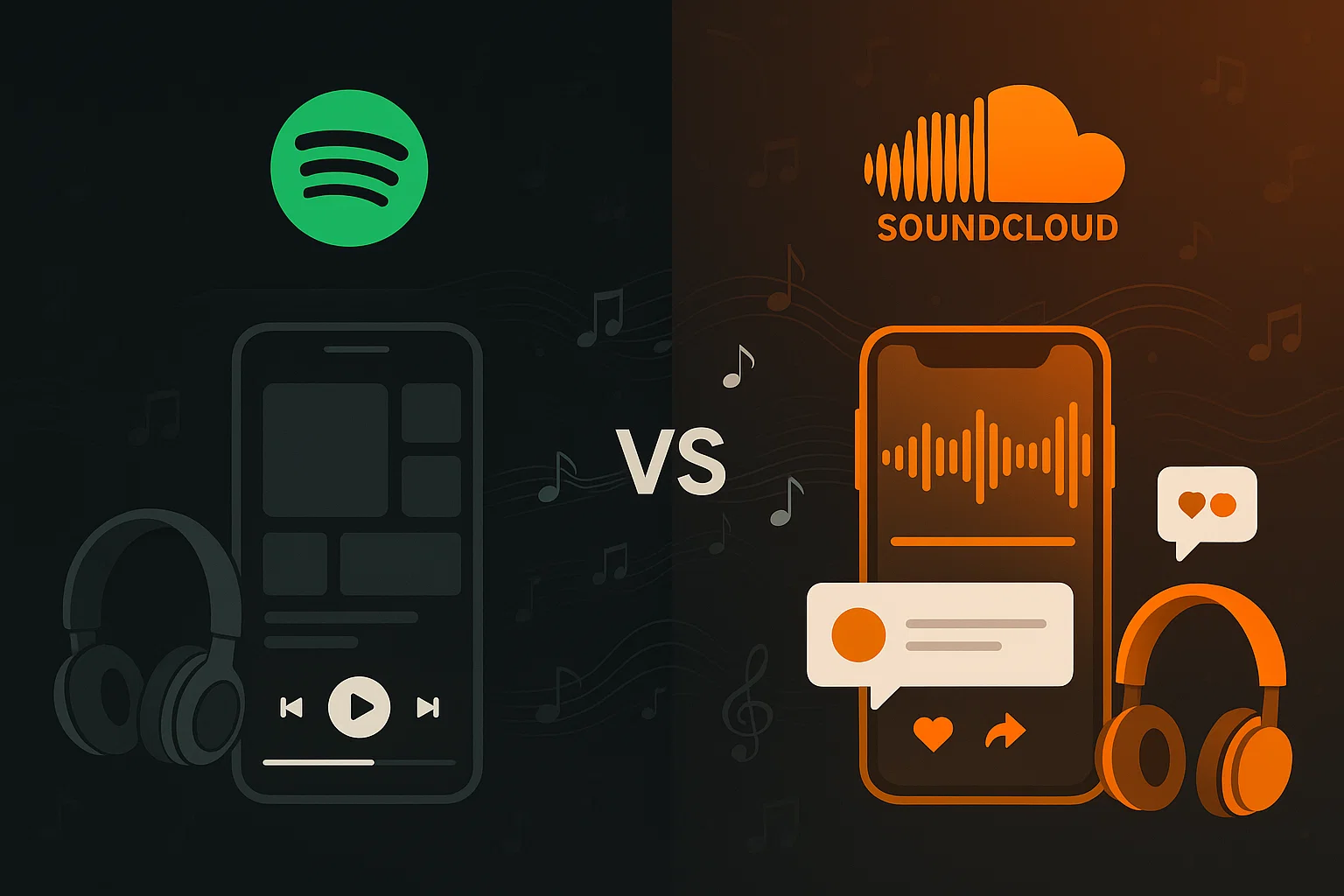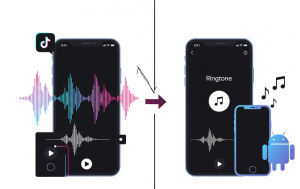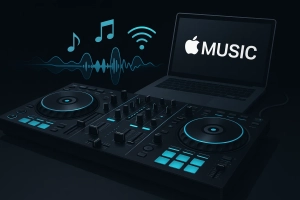Here’s a stat that might surprise you: while Spotify boasts over 600 million users worldwide, SoundCloud hosts more than 40 million creators—that’s nearly 7% of its user base actively making music. We’re dealing with two completely different beasts.
I’ve been juggling both platforms for years, and the “which is better” question misses the point entirely. After countless hours of testing and comparing, I’ve learned that choosing between Spotify and SoundCloud isn’t about finding the “winner.” It’s about understanding what each platform does best.
Whether you’re hunting for underground tracks, building your music collection, or want the smoothest listening experience, this guide will help you make the right choice.
In This Article:
Two Completely Different Animals
Spotify: The Polished Music Machine
Think of Spotify as the Netflix of music—polished, algorithm-driven, and designed for mass consumption. When I first switched from my old MP3 collection, honestly? It felt like stepping into the future.
Here’s what blew my mind: I’d been manually organizing playlists for years, and suddenly Spotify was doing it better than I ever could. The platform’s strength lies in its massive catalog of official releases and consistently excellent audio quality, especially with Premium’s 320kbps streaming.
But the real game-changer? That recommendation engine is scary good. I discovered my now-favorite indie rock band through Discover Weekly—the algorithm had analyzed my listening patterns so precisely that it knew I’d love them before I did. We’re talking about a band with 50,000 monthly listeners that somehow perfectly matched my taste for electronic-influenced rock from the mid-2010s.
⚠️ The Reality Check: Spotify’s mainstream focus means you won’t find those raw, unpolished gems. No bootlegs, no bedroom recordings, no experimental mashups. It’s clean, professional, and sometimes… predictable. I’ve noticed my music taste actually narrowed after a year of heavy Spotify use.
SoundCloud: Where Creativity Gets Messy (And That’s the Point)
SoundCloud operates on a completely different philosophy—creativity runs wild, anyone can upload anything, and the next big hit might be hiding in someone’s bedroom recording.
What struck me most wasn’t the music itself, but the community. You can comment directly on tracks, follow emerging artists, and discover music that literally doesn’t exist anywhere else. I’ve found incredible remixes of songs that would never get official release, live recordings from underground venues, and experimental tracks that major labels would never touch.
Here’s a story that perfectly captures SoundCloud’s magic: I discovered this producer from Romania who was making these insane electronic-jazz fusion tracks. Started following him when he had maybe 200 followers. Fast forward two years, and he’s now signed with a major electronic label. That journey from bedroom producer to professional artist? I watched it happen in real-time through his SoundCloud uploads.
🎵 The Beautiful Chaos: SoundCloud’s democratic approach means that teenager in their bedroom can potentially reach millions of listeners. But here’s the trade-off—audio quality varies wildly. Some tracks sound professionally mastered, others like they were recorded on a phone in a bathroom. It’s part of SoundCloud’s charm, but can be jarring when you’re used to Spotify’s consistency.
The Harsh Reality About “Owning” Your Music
Does Audio Quality Actually Matter? (Spoiler: It Depends)
Let’s talk about actual audio quality in real-world scenarios. I’ve done side-by-side comparisons, and the differences are more nuanced than expected.
Spotify Premium delivers consistent 320kbps quality across its catalog. Through decent headphones, the difference between Spotify and CD quality is minimal, with excellent dynamic range and clear separation.
SoundCloud’s quality varies dramatically. Official uploads often match Spotify’s quality, but user-generated content ranges from crystal-clear studio recordings to compressed bedroom demos.
Bottom line: if you’re using phone speakers or basic earbuds, the difference is negligible. For serious listening with good equipment, Spotify’s consistency wins.
The Day I Lost 500 Songs (And What I Learned)
Here’s where I made my biggest mistake early on: I spent years building playlists, assuming my music would always be there. Then artists started removing tracks, and I realized I didn’t actually “own” anything.
Both platforms offer offline downloads with premium subscriptions, but they’re temporary and tied to active subscriptions. Cancel your subscription, lose your music.
This is where I discovered tools like Cinch Audio Recorder. The key insight: streaming platforms give you access, not ownership. Understanding this distinction changed how I approach music collection entirely.
Algorithm vs Humans: The Discovery Battle
Spotify Knows Me Better Than I Know Myself
Spotify’s recommendation system analyzes not just what you listen to, but when, how long, and what you skip. It creates eerily accurate taste profiles over time.
My Discover Weekly has introduced me to more new music than any other source. The algorithm creates genre-specific Daily Mixes that perfectly capture different moods and musical phases.
The limitation? Spotify’s algorithm is conservative, designed to keep you engaged rather than challenge your taste. You’ll discover new music safely within your comfort zone. Revolutionary discoveries are rare.
SoundCloud: Where Real People Share Real Music
SoundCloud takes the opposite approach—discovery through human connections. Following artists, exploring reposts, diving into comment threads. It’s messier but often more rewarding.
I’ve discovered favorite tracks through SoundCloud’s comment system. Someone drops a timestamp for the best part of a mix, another shares a similar track, and suddenly I’m down a rabbit hole of incredible music.
The repost feature creates organic discovery chains. When artists I follow repost something, it’s usually worth checking out—like having music-savvy friends constantly sharing recommendations.
This human element makes discovery more serendipitous but less reliable. Some days you’ll uncover gold, others wade through mediocre uploads.
The Creator’s Perspective
Upload Freedom vs Distribution Power
The differences for emerging artists are stark. SoundCloud’s upload process is simple: create account, upload, publish. Tracks go live in minutes.
Spotify requires a distributor like DistroKid or TuneCore—more complex, with waiting periods and costs. The trade-off: once on Spotify, your music reaches 600 million potential listeners with sophisticated discovery tools.
I watched a friend with a great track but limited budget choose SoundCloud for immediate sharing over Spotify’s $20 upfront cost with no discovery guarantee.
Monetization Reality Check
Spotify pays more per stream ($0.003-0.005) but requires significant volume for meaningful income. SoundCloud’s payouts are lower, but its user-centric model sends your subscription money directly to artists you listen to.
💰 Reality Check for Artists:
- Need 1 million Spotify streams to earn ~$4,000
- SoundCloud’s user-centric model means better payouts for niche artists
- Real value is exposure and fan building, not streaming revenue
For emerging artists, neither platform pays enough to matter initially. The real value is exposure and fan building—SoundCloud excels at community building, Spotify offers broader reach.
Solving the “Save Music Forever” Problem
Why Streaming Isn’t Always Enough
Here’s what I wish I’d understood earlier: streaming platforms are rental services, not ownership. Tracks disappear when licensing deals expire or artists pull catalogs. I’ve lost count of songs that vanished from my playlists.
This hit home when a favorite underground artist removed their entire SoundCloud catalog after signing with a label. Years of curated music—gone overnight. That’s when I realized I needed a backup strategy.
Cinch Audio Recorder – Your Music Backup Solution
After trying various solutions, I found Cinch Audio Recorder most reliable for preserving streaming music. Unlike tools that hack APIs, Cinch records audio as it plays—completely legal and platform-agnostic.
What impressed me most: automatic metadata handling. Recording from Spotify or SoundCloud, Cinch captures song titles, artists, and album art without manual input. The resulting MP3 files are properly tagged and ready for any player.
The process is simple: launch Cinch, hit record, play music. It captures everything at the same quality you’re hearing, building a permanent collection independent of subscriptions or licensing agreements.
🎯 Real-World Example: I use this for those amazing SoundCloud remixes that often disappear when artists get DMCA takedowns. Last month, I saved a incredible mashup of Daft Punk and The Weeknd that got removed three days later. Now it’s permanently in my collection.
For music lovers wanting to preserve discoveries, especially rare SoundCloud finds that might disappear, Cinch offers peace of mind. You’re creating personal backups of tracks you legitimately access. Check out our detailed streaming music recording guide for more tips.
Download Cinch Audio Recorder:
The software has saved me countless hours and prevented the heartbreak of losing favorite tracks. Whether you’re a casual listener or serious music collector, having a reliable backup method is essential in today’s streaming-dominated landscape.
Cost Analysis – Beyond the Monthly Fee
Hidden Costs and Long-term Value
Everyone focuses on subscription prices, but real cost analysis is more complex. Spotify Premium costs $11.99/month, SoundCloud Go+ is $10.99. That $12 annual difference seems trivial until you factor in hidden costs.
With Spotify, you’re locked in—cancel your subscription, lose your music. That’s $144 annually for access, not ownership. Over five years, you’ve spent $720 with nothing permanent.
Here’s my analysis: casual listeners who stick with mainstream music get better value from Spotify Premium. The convenience and discovery justify the cost.
But music collectors or underground music lovers get better long-term value combining SoundCloud’s generous free tier with tools like Cinch Audio Recorder ($25.99 one-time). You build permanent collections while exploring unique content.
Key insight: factor ownership versus access. Streaming subscriptions provide temporary access. Recording tools require upfront investment but create permanent value.
Here’s my honest cost breakdown after using both platforms for 3+ years:
| Feature | Spotify Premium | SoundCloud Go+ | Free Tiers + Cinch |
|---|---|---|---|
| Monthly Cost | $11.99 | $10.99 | $0 (after $25.99 one-time) |
| Annual Cost | $143.88 | $131.88 | $0 |
| 5-Year Total | $719.40 | $659.40 | $25.99 |
| Music Ownership | ❌ Rental only | ❌ Rental only | ✅ Permanent files |
| Offline Access | ✅ While subscribed | ✅ While subscribed | ✅ Forever |
| Discovery Quality | ⭐⭐⭐⭐⭐ | ⭐⭐⭐ | ⭐⭐⭐⭐ (manual) |
| Content Variety | Mainstream focus | Underground focus | Both accessible |
💡 Pro Tip: I use SoundCloud’s free tier for discovery, then record my favorites with Cinch. Best of both worlds without the monthly fees.
| Feature | Spotify Premium | SoundCloud Go+ | Cinch + Free Tiers |
|---|---|---|---|
| Monthly Cost | $11.99 | $10.99 | $0 (after initial purchase) |
| Music Ownership | No | No | Yes |
| Offline Access | Yes (temporary) | Yes (temporary) | Yes (permanent) |
| Discovery Quality | Excellent | Good | Manual but rewarding |
| Content Variety | Mainstream focus | Underground focus | Both platforms accessible |
Conclusion
After years using both platforms, here’s what I’ve learned: Spotify and SoundCloud aren’t competitors—they’re complementary tools for different music needs.
Choose Spotify for effortless discovery, consistent quality, and mainstream content. Its algorithm is unmatched for finding music within your taste profile.
Choose SoundCloud for underground music, supporting emerging artists, and community-driven discovery. It offers musical experiences you can’t find elsewhere.
My real recommendation: use both strategically. Leverage Spotify’s discovery engine, then check SoundCloud for exclusive content. Use SoundCloud for underground gems, then see if artists have official Spotify releases.
Most importantly, build a permanent collection alongside streaming. Tools like Cinch Audio Recorder ensure discoveries don’t disappear when licensing changes.
The future is hybrid—streaming for discovery, personal collections for permanence. Don’t put all your musical eggs in one basket.
FAQ
Which platform has better audio quality?
Spotify Premium offers more consistent quality at 320kbps across its catalog. SoundCloud’s quality varies by upload, ranging from excellent to mediocre depending on the source.
Can I download music from both platforms?
Both offer offline listening with premium subscriptions, but downloads are temporary and tied to active subscriptions. For permanent downloads, you’ll need third-party recording tools like Cinch Audio Recorder.
Which is better for discovering new music?
Spotify excels at algorithmic discovery within your taste profile. SoundCloud is better for finding experimental, underground, or genre-bending music through community interaction.
Are there free alternatives to premium subscriptions?
Both platforms offer free tiers with limitations. Spotify’s free version includes ads and shuffle-only mobile playback. SoundCloud’s free tier is more generous but still includes ads.
How do I backup my music discoveries permanently?
Use audio recording software like Cinch Audio Recorder to create permanent copies of tracks you have legitimate access to through streaming platforms.








